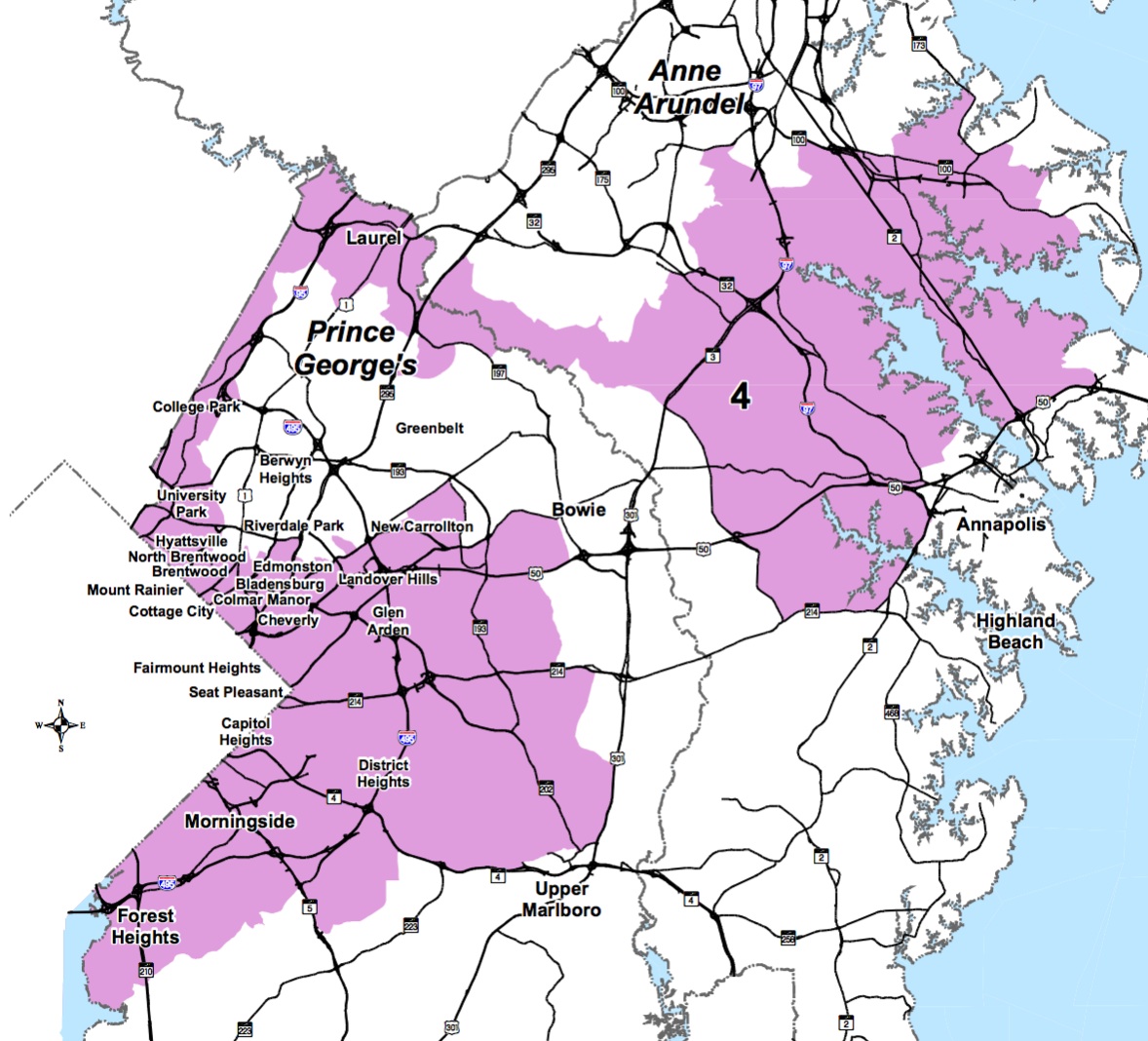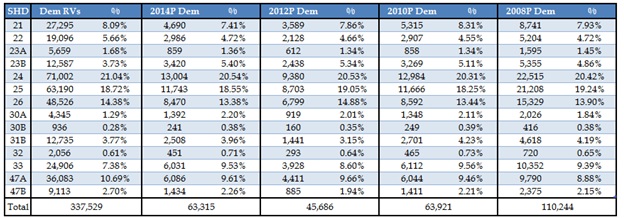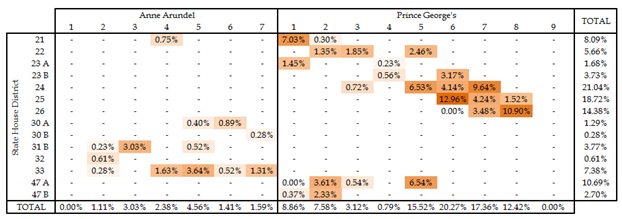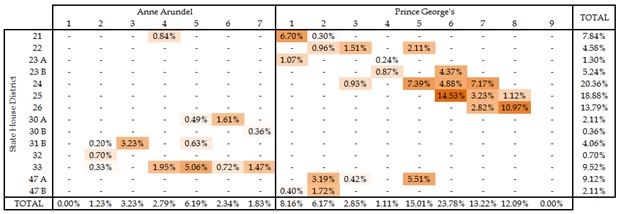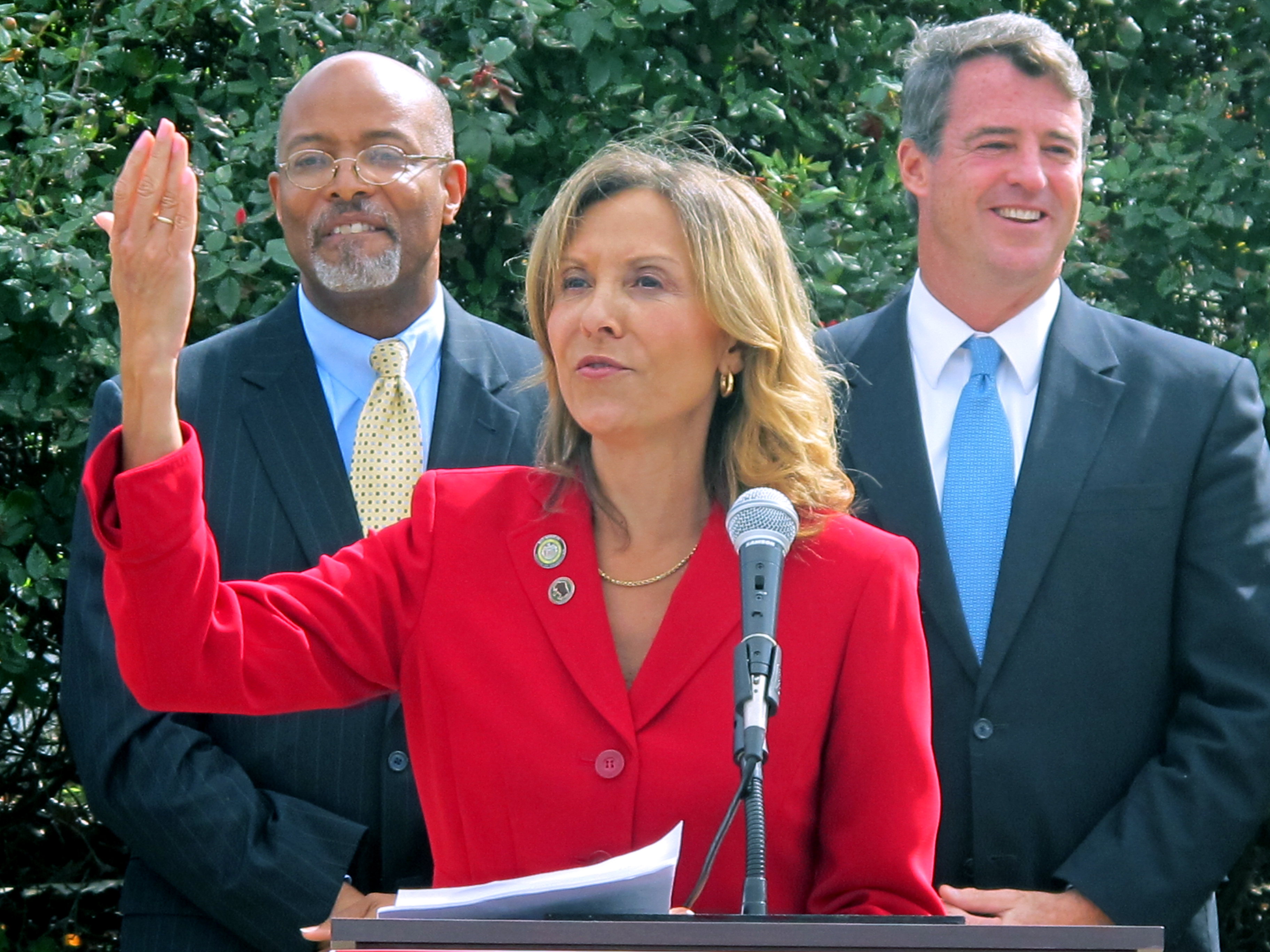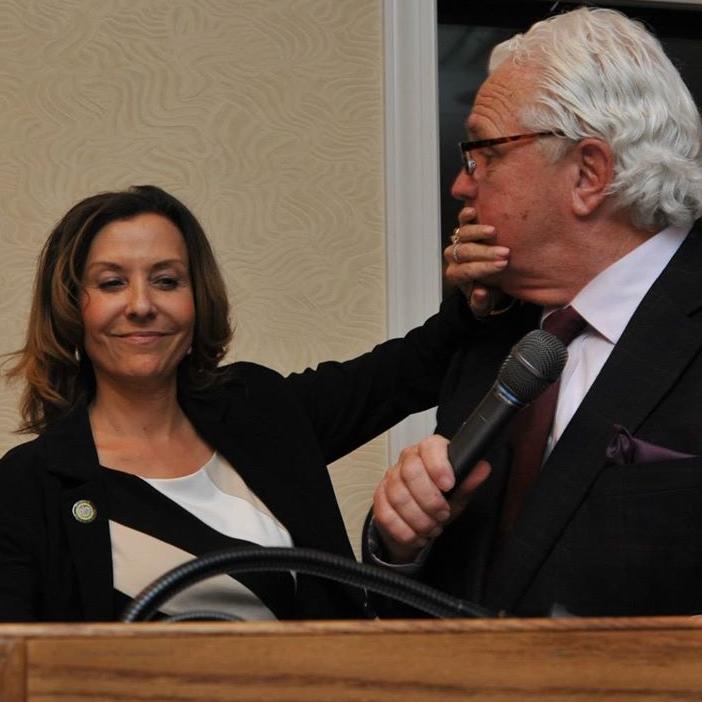The overwhelmingly Democratic Fourth Congressional District will be open in 2016 since incumbent Rep. Donna Edwards is making a bid for the U.S. Senate rather than seeking reelection. So where do the Democrats who will vote in the primary live?
Registered Democrats by Legislative District
The Fourth CD is split between Anne Arundel and Prince George’s but 86% of registered Democrats live in Prince George’s. Former Prince George’s State’s Attorney Glenn Ivey was on the ballot repeatedly, though he has not been on the ballots since 2006.
The following table shows the number of registered Democrats as well as the number who voted in each of the four past Democratic primaries within the portion of each state legislative district included in the Fourth Congressional District.
Newly elected Del. Erek Barron (D-24) is rumored to be interested in running for the Fourth. At 21.0%, D24 has the highest share of registered voters. Though Democratic primary turnout is slightly sub par, voters in this legislative district nonetheless consistently provided over one-fifth of all voters.
District 25 does not lag far behind District 24’s voting power with 18.7% of the CD 4’s registered Democrats. This is Lt. Gov. Anthony Brown’s former legislative district. Talented Del. Dereck Davis (D-25), the powerful Chair of the Economic Matters Committee, is also said to be musing about running for the seat.
Del. Jay Walker (D-26) is openly exploring a bid. Sen. Anthony Muse (D-26) from the same district is also rumored to be thinking about it. D26 has the third highest share of registered Democrats but lags notably behind either D24 or D25 with 14.4% of CD 4’s Democrats. Moreover, turnout is often mediocre–it fell as low as 13.4% of the Fourth’s total though it reached 14.9% on the one occasion in which the share of voters exceeded registrants.
Former Del. Jolene Ivey represented District 47 under different boundaries before redistricting. The current version of D47 holds 13.4% of CD 4’s registered Democrats but turnout consistently lags. In the past four Democratic primaries, voters from D47 never comprised more than 11.9% of the voters in CD 4.
Nevertheless, Jolene Ivey, a successful and highly talented politician in her own right who ran for Lt. Governor last year, will undoubtedly be an asset to her husband Glenn Ivey’s campaign. When she last ran for the House in 2010, she came in first by a mile in a crowded primary with eight candidates.
Del. Joseline Peña-Melnyk (D-21) is planning a run. Currently, she represents just 8.1% of registered Democratic in CD 4. A small base on which to build.
Registered Democrats by Legislative and County Council Districts
The second table shows the share of registered Democrats broken down by state legislative and county council district. None of the Anne Arundel Councilmembers represent more than 5% of registered Democrats in CD 4.
Prince George’s Council Vice Chair Derrick Davis (D-6)–not to be confused with the state legislator with the very similar name–represents 20.3% of registered Democrats but 64% also live in Legislative District 25. As this is declared candidate Anthony Brown’s former district and Del. Dereck Davis’s current district, competition for these voters could be fierce.
Councilwoman Karen Toles (D-7) represents 17.4% of CD 4’s registered Democrats. This district has significant overlap with Del. Erek Barron’s legislative district, as well as those of Brown/Davis and Walker/Muse. 15.5% of CD 4’s registered Dems also live in Council District 5, held by Andrea Harrison. This district has a lot of overlap with D24 (Barron) and D47A (Jolene Ivey).
Former Council Chair Ingrid Turner has expressed interest in running for the Fourth. But she represented Council District 4. In its current incarnation, it falls almost entirely into CD 5. Just 0.8% of CD 4’s registered Dems live in District 4.
Likely Voters by State Legislative and County Council Districts
The final table breaks down the share of Democrats who voted in at least two of the past four primaries by state legislative district and county council district:
This table indicates even more cleanly that Council District 6 is the heartland of CD 4’s Democratic voters. While it has less than a 3% advantage over Council District 7 in registered Dems, it has a 10.6% lead over the same district in two-time primary voters–23.8% versus 13.2%. No wonder Dereck Davis is thinking about running. (Notice also that Council District 5 leapfrogs ahead of Council District 7 in this table.)
Among state legislative districts, the biggest drop is in D47, which has 2.2% fewer two-time primary voters than registered Dems. Legislative Districts 24 and 25 have a slightly higher share of two-time primary voters than registered Democrats. But the statistics change less dramatic; the increase is 0.7% for D24 and 0.2% for D25. In contrast, the share of two-time primary voters is lower the registered Dems by 0.6% in D26.
Based on this table, the most desirable pieces of real estate to have represented before in terms of Democratic primary turnout are:
1. Maryland (Brown)
2. Prince George’s County (Ivey)
3. Prince George’s County Council District 6 (Derrick Davis)
4. State Legislative District 24 (Barron)
5. State Legislative District 25 (Dereck Davis/Brown)
6. Anne Arundel County
7. Prince George’s County Council District 5
8. State Legislative District 26 (Walker/Muse)
9. Prince George’s County Council District 7
10. Prince George’s County Council District 8
11. State Senate District 47
12. State Legislative District 33
13. State House District 47A
14. Prince George’s County Council District 1
15. State Legislative District 21 (Peña-Melnyk)

